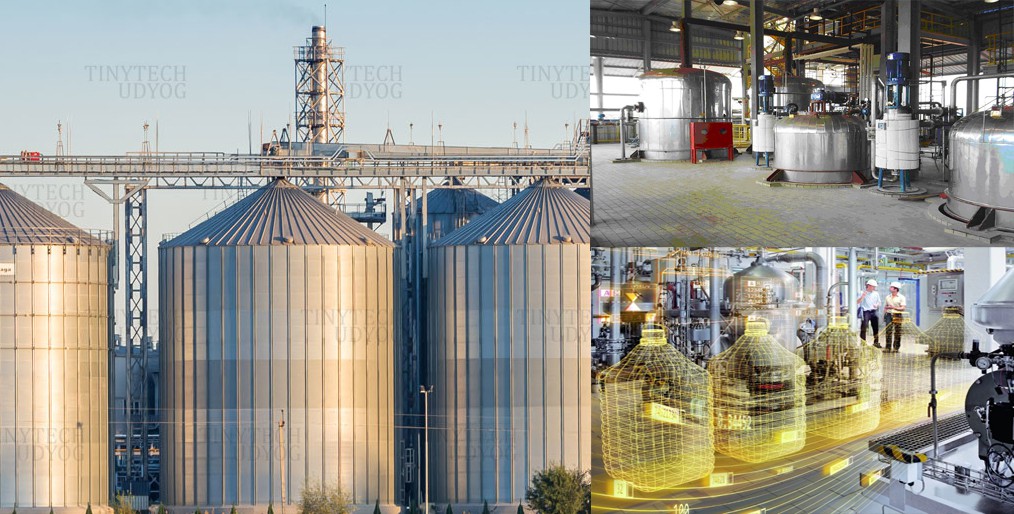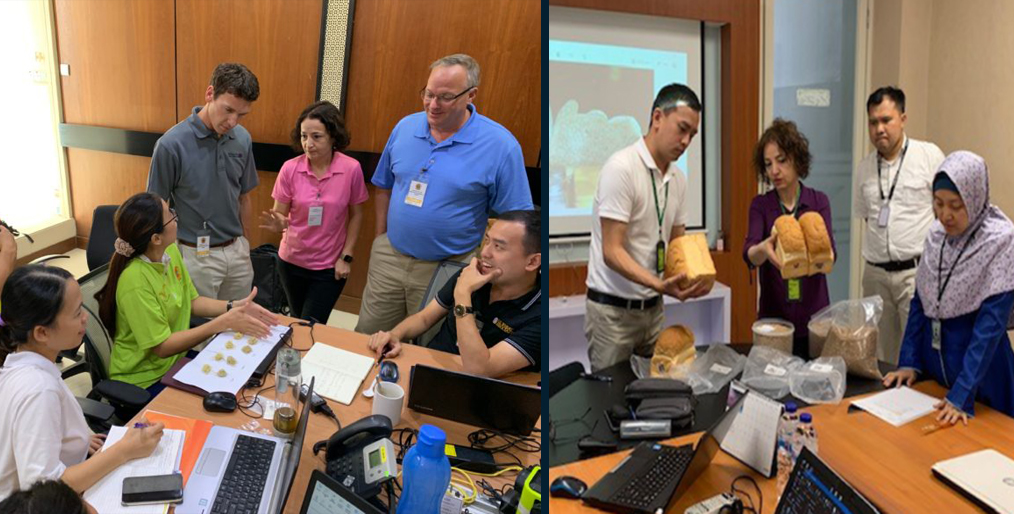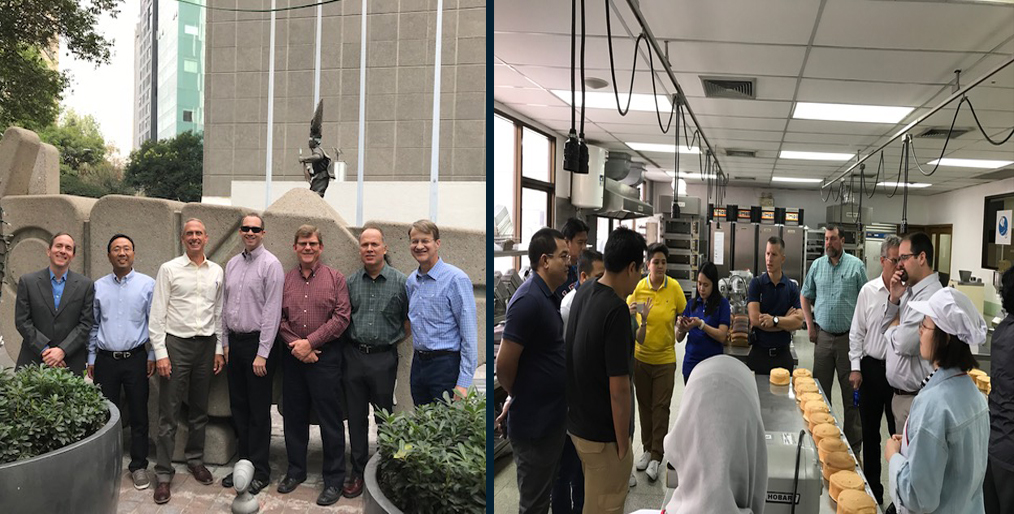
[caption id="attachment_4362" align="aligncenter" width="1014"] A USW Japanese trade delegation visits the USDA Western Wheat Quality Lab.[/caption]
Professional millers and bakers know that the appearance and taste of every product depends on the specific characteristics imparted by its flour ingredient. And those characteristics are deeply rooted in the ancient craft of plant breeding.
As far back as 10,000 years, farmers looked for traits that helped them grow more and better food. Egypt became the breadbasket of ancient Rome as its farmers adopted a type of wheat from the “fertile crescent” in modern Iraq to plant along the Nile River. Over time, the Egyptians found ways to grow a grain that was sturdy enough to transport long distances and stand up against pests. The Egyptian wheat traded with the Romans may not be what we are used to today, but the process for how it was grown to meet the needs of the consumer is by no means ancient history.
Today, the Wheat Genetics Resource Center at the Kansas Wheat Innovation Center houses more than 30,000 wheat varieties from around the world that are descendants of ancient varieties. Kansas Wheat Vice President of Research and Operations Aaron Harries likened the collection to a “treasure hunt,” offering the opportunity to find the next innovation derived in part from each specimen. Researchers and breeders here, and at other programs across the United States, play an important role in the relationship U.S. Wheat Associates (USW) builds with its customers. By listening to both farmer and customer feedback, they work on developing high-yielding, disease resistant wheat seed with excellent milling, baking and processing qualities.
Dr. Senay Simsek is a cereal chemist and professor at North Dakota State University and says that the personal connections that she has made on fifteen trips with USW to four different continents is crucial to her work. As an expert on hard red spring (HRS) wheat, Simsek says that when she prepares to meet overseas customers, she familiarizes herself with the types of wheat flour products they make, what the other ingredients are and what countries they buy wheat from. Being familiar with a market is important to understanding the unique needs of the customer. “Sophisticated” was the word she uses to describe customer needs and knowledge, emphasizing how important the technical process of using the right wheat for a specific product can be.
[caption id="attachment_4363" align="aligncenter" width="1014"]
A USW Japanese trade delegation visits the USDA Western Wheat Quality Lab.[/caption]
Professional millers and bakers know that the appearance and taste of every product depends on the specific characteristics imparted by its flour ingredient. And those characteristics are deeply rooted in the ancient craft of plant breeding.
As far back as 10,000 years, farmers looked for traits that helped them grow more and better food. Egypt became the breadbasket of ancient Rome as its farmers adopted a type of wheat from the “fertile crescent” in modern Iraq to plant along the Nile River. Over time, the Egyptians found ways to grow a grain that was sturdy enough to transport long distances and stand up against pests. The Egyptian wheat traded with the Romans may not be what we are used to today, but the process for how it was grown to meet the needs of the consumer is by no means ancient history.
Today, the Wheat Genetics Resource Center at the Kansas Wheat Innovation Center houses more than 30,000 wheat varieties from around the world that are descendants of ancient varieties. Kansas Wheat Vice President of Research and Operations Aaron Harries likened the collection to a “treasure hunt,” offering the opportunity to find the next innovation derived in part from each specimen. Researchers and breeders here, and at other programs across the United States, play an important role in the relationship U.S. Wheat Associates (USW) builds with its customers. By listening to both farmer and customer feedback, they work on developing high-yielding, disease resistant wheat seed with excellent milling, baking and processing qualities.
Dr. Senay Simsek is a cereal chemist and professor at North Dakota State University and says that the personal connections that she has made on fifteen trips with USW to four different continents is crucial to her work. As an expert on hard red spring (HRS) wheat, Simsek says that when she prepares to meet overseas customers, she familiarizes herself with the types of wheat flour products they make, what the other ingredients are and what countries they buy wheat from. Being familiar with a market is important to understanding the unique needs of the customer. “Sophisticated” was the word she uses to describe customer needs and knowledge, emphasizing how important the technical process of using the right wheat for a specific product can be.
[caption id="attachment_4363" align="aligncenter" width="1014"] Dr. Senay Simsek joins USW staff to meet with U.S. wheat customers in Malaysia (Left) & in Indonesia (Right) in 2019.[/caption]
Each year, USW hosts several trade delegations that are traveling to the United States to learn firsthand about the U.S. wheat supply chain system. The delegations visit research institutes like the USDA Western Wheat Quality Lab at Washington State University in Pullman, Wash. Its mission in part is to “conduct cooperative investigations with breeders to evaluate the milling and baking quality characteristics of wheat selections,” and to “conduct basic research into the biochemical and genetic basis of wheat quality in order to better understand the fundamental nature of end-use functionality.” The director of the lab, Dr. Craig Morris, welcomes many of the USW delegations to his lab each year and emphasizes the unique partnership that the lab, as part of the USDA Agricultural Research Service, has within the industry, among other researchers and with state wheat commissions.
In September 2019, I had the opportunity to visit Washington State University with a trade delegation from Southeast Asia. We met with Dr. Michael Pumphrey, a spring wheat breeder, who walked us through the steps of the wheat breeding process. We watched as he cross-pollinated single wheat plants, a process that requires careful, precise techniques.
In his 27 years with USW, Steve Wirsching, Vice President and West Coast Office Director, based in Portland, Ore., has hosted many trade delegations and has also led many Wheat Quality Improvement Teams of wheat breeders to visit customers overseas. When asked why USW continues to put an emphasis on facilitating the relationships between customers and wheat researchers and breeders, he said, “It is important to listen to our customers and seek feedback on the quality characteristics they need. It is part of the U.S. Wheat Associates mission, to enhance wheat’s value for our customers.”
[caption id="attachment_4364" align="alignnone" width="1014"]
Dr. Senay Simsek joins USW staff to meet with U.S. wheat customers in Malaysia (Left) & in Indonesia (Right) in 2019.[/caption]
Each year, USW hosts several trade delegations that are traveling to the United States to learn firsthand about the U.S. wheat supply chain system. The delegations visit research institutes like the USDA Western Wheat Quality Lab at Washington State University in Pullman, Wash. Its mission in part is to “conduct cooperative investigations with breeders to evaluate the milling and baking quality characteristics of wheat selections,” and to “conduct basic research into the biochemical and genetic basis of wheat quality in order to better understand the fundamental nature of end-use functionality.” The director of the lab, Dr. Craig Morris, welcomes many of the USW delegations to his lab each year and emphasizes the unique partnership that the lab, as part of the USDA Agricultural Research Service, has within the industry, among other researchers and with state wheat commissions.
In September 2019, I had the opportunity to visit Washington State University with a trade delegation from Southeast Asia. We met with Dr. Michael Pumphrey, a spring wheat breeder, who walked us through the steps of the wheat breeding process. We watched as he cross-pollinated single wheat plants, a process that requires careful, precise techniques.
In his 27 years with USW, Steve Wirsching, Vice President and West Coast Office Director, based in Portland, Ore., has hosted many trade delegations and has also led many Wheat Quality Improvement Teams of wheat breeders to visit customers overseas. When asked why USW continues to put an emphasis on facilitating the relationships between customers and wheat researchers and breeders, he said, “It is important to listen to our customers and seek feedback on the quality characteristics they need. It is part of the U.S. Wheat Associates mission, to enhance wheat’s value for our customers.”
[caption id="attachment_4364" align="alignnone" width="1014"] 2018 Wheat Quality Improvement Team in Latin America (Left) & 2017 Wheat Quality Improvement team in Thailand (Right).[/caption]
Find more...
Source: Online/SZK
2018 Wheat Quality Improvement Team in Latin America (Left) & 2017 Wheat Quality Improvement team in Thailand (Right).[/caption]
Find more...
Source: Online/SZK
Comment Now